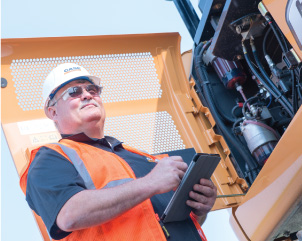Best Practices
Road Safety Tips
Dress
- Clothing—Never wear loose jackets, shirts, or pants. Loose clothing can get caught in moving parts.
- Shoes—Always wear work boots with non-skid soles and steel toes. Keep the soles free of tack.
- Safety glasses—Safety glasses should be worn when there is any possibility of damaging the eyes.
- Gloves—Gloves should be worn to protect hands when climbing on equipment.
- Ear plugs—Ear protection is required whenever jackhammers or other loud noises are present.
Safety Precautions
- Operators should complete a safety check with a daily walk around to identify potential hazards.
- Never position yourself between the paver and a hauling truck backing into the hopper.
- Stay back a safe distance while the truck dump bed is in motion and when the paver hopper wings are in operation.
- When collecting weigh tickets from the driver's side, remember that fast moving traffic is only a step away.
- When climbing onto a truck, use the steps and handholds when they are available.
- Do not climb onto truck running boards, unless it is absolutely necessary.
- Inform the driver before climbing onto the truck bed.
- Don't distract the driver or other individuals by talking unnecessarily.
- Be alert to changes in conditions that affect safety hazards. As an example, there are fewer safety risks with one-way traffic than two-way traffic.
- Park the vehicles that are not in use out of the way of the traffic.
- When you are on a road or paving job, keep hydrated by drinking water continuously. Heat exhaustion can set in quickly.
- Always follow good, common sense safety practices.
Use Appropriate Safety Equipment
- Safety Vests—Fluorescent vests, t-shirts, and bright colored caps should be worn at all times while engaged in operations in or near a highway open to traffic. Vests should be properly adjusted to minimize snagging.
- Hard Hats—Always wear hard hats when you may be exposed to falling or flying objects that could result in head injuries. Such conditions include the presence of overhead equipment, such as cranes, backhoes, loaders, or other large equipment.
- Seat Belts—Operators and occupants of any type of vehicle should always wear the complete seat belt assembly.
- Gloves—Gloves should be worn to protect hands when climbing on equipment.
- Safety Glasses—ANSI approved safety glasses should be worn at all times to avoid eye injuries. Approved glasses are marked on the frame, lens or both. This approval indicates that the glasses have passed specified tests for strength and durability.
Are you looking to rent roadwork equipment? We've got you covered. Call our rental experts today!

